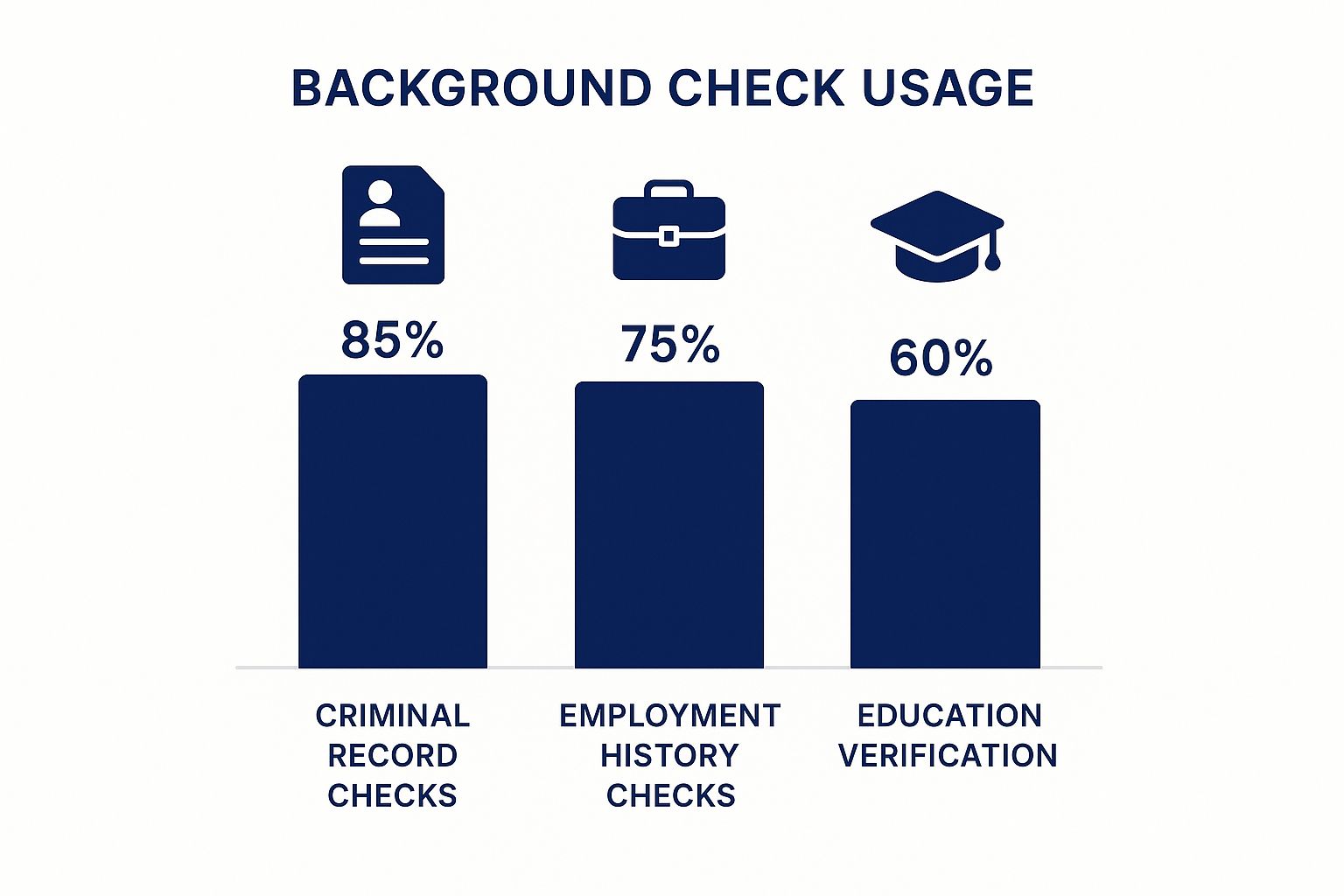Pre Employment Screening: Protect Your Business Today
- Sentry Private Investigators

- May 21, 2025
- 11 min read
Updated: Jul 28, 2025
Why Pre-Employment Screening Is Your Business Safeguard

Think of your business like your home. You wouldn't leave the front door wide open, right? Pre-employment screening is that lock, keeping your company safe from potential problems. It helps you really know who you're hiring, preventing nasty surprises later on and building a more secure business.
Protecting Your Assets and Reputation
Protecting your company's assets is a major reason for screening. Employees have access to important stuff: information, equipment, and money. Screening can help identify people with a history of theft, fraud, or other risky behaviours. This proactive approach can save you from big financial losses and damage to your reputation. Imagine the fallout from a data breach caused by a disgruntled employee with a past in cybercrime. Screening can help you dodge those bullets.
Protecting your company's reputation is another plus. Negligent hiring, where an employer doesn't do proper checks and hires someone who harms others, can lead to lawsuits and bad press. Solid screening shows you're committed to responsible hiring. This reduces legal risks and boosts your image with clients, partners, and the public.
Ensuring A Safer Workplace
Pre-employment screening creates a safer environment for everyone. Background checks can flag individuals with a history of violence, harassment, or substance abuse. This is particularly key in fields like healthcare, education, and childcare where employees work with vulnerable people. A safer workplace means higher productivity, less stress, and a more positive atmosphere.
Furthermore, screening is even more important in the UK. A 2024 report from HireRight found 36% of discrepancies in background checks were related to employment history. This shows how often candidates exaggerate their experience, highlighting the need for careful verification. Find more detailed statistics here Verifying references is super important. Hiring the wrong person can have a ripple effect on your team and the entire business.
Choosing The Right Path: DIY or Professional Help?
You might think doing screening yourself is a good idea. But for the best results, consider private investigator background checks. These specialised services have access to better databases and understand UK law. This ensures thorough and compliant screening, giving you the peace of mind you need to build a strong and secure team. Expert help is especially useful for sensitive roles or international candidates, giving you the clearest picture before making big hiring decisions.
The Building Blocks of Bulletproof Pre-Employment Screening

The infographic above gives us a quick look at how often three common pre-employment screening checks are used: Criminal Record Checks, Employment History Checks, and Education Verification. It’s clear that criminal record checks are the most popular, with employment history checks following close behind. Education verification comes in third. This shows us how different companies value different aspects of a candidate’s background, depending on the job and the industry.
Effective pre-employment screening is more than just going through the motions. It’s about creating a solid process that protects your business. This means understanding the key parts of screening and how they work together. Think about how different checks reveal important information that helps you make the best hiring decisions. Choosing the right mix of checks is essential.
Essential Checks for UK Businesses
There are a few essential checks that make up a strong pre-employment screening program in the UK.
Right to Work Checks: This is a must-do for all UK employers. It confirms that a candidate can legally work in the country.
Criminal Record Checks (DBS Checks): These checks show a candidate’s criminal history. They’re very important for jobs involving vulnerable people or sensitive info. There are different levels of DBS checks – Basic, Standard, and Enhanced – depending on what the job requires.
Employment History Verification: This double-checks a candidate's previous jobs, confirming dates of employment, job titles, and sometimes even what they did in those roles. It helps spot any inconsistencies and makes sure their CV is accurate. Getting the right people on board is key, and beating the staffing challenge can be tough.
Education Verification: This makes sure a candidate actually has the qualifications they say they have.
Reference Checks: These give you a peek into a candidate’s past performance, how they work, and if they’d be a good fit for the job. It's a chance to get valuable feedback from their old bosses.
Credit Checks: If the job involves handling money, credit checks can tell you about a candidate’s financial situation and if there might be any risks.
Social Media Checks: Looking at someone’s public social media activity (while staying within the law, of course!) can sometimes give you helpful insights. Read more in our article, How to Master Your Due Diligence Efforts.
The table below provides a summary of the various pre-employment screening checks.
Types of Pre Employment Screening Checks in the UK
Check Type | What It Reveals | When to Use | Legal Considerations |
|---|---|---|---|
Right to Work Check | Eligibility to work in the UK | Mandatory for all employees | Immigration, Asylum and Nationality Act 2006 |
Criminal Record Check (DBS Check) | Criminal history | Roles involving vulnerable individuals, sensitive information | Data Protection Act 2018, Rehabilitation of Offenders Act 1974 |
Employment History Verification | Previous employment details (dates, titles, responsibilities) | All roles to verify CV accuracy | Data Protection Act 2018 |
Education Verification | Confirmation of qualifications | Roles requiring specific credentials | Data Protection Act 2018 |
Reference Checks | Insights into past performance, work ethic, suitability | Most roles | Data Protection Act 2018 |
Credit Checks | Financial stability and potential risks | Roles with financial responsibilities | Data Protection Act 2018, Consumer Credit Act 1974 |
Social Media Checks | Publicly available information about a candidate | Can be useful for most roles | Data Protection Act 2018, Equality Act 2010 |
This table gives a good overview of the checks, what they show, when to use them, and the legal stuff you need to keep in mind.
Tailoring Your Screening Process
Not all jobs need the same level of checking. A cashier might only need basic checks, while a senior financial controller needs a much deeper dive, maybe even using private investigator background checks. This targeted approach makes sure you're focusing your resources where they’re needed most.
This brings up another important point: the legal side of screening. Following UK data protection laws is crucial. Knowing what each check can and can’t tell you is also important. No single check gives you the whole picture. It’s the combination of carefully chosen and properly done checks that gives you the most reliable results.
Navigating the GDPR Minefield in Candidate Screening

Pre-employment screening is a must for any business, but in the UK, it's a delicate balancing act. You need to be thorough, yet respect data privacy. This means carefully navigating the General Data Protection Regulation (GDPR). This regulation has a huge impact on how UK businesses handle candidate information during background checks. Ignoring the rules? Let's just say it could lead to hefty fines and a damaged reputation. Understanding GDPR isn’t just a legal thing; it’s about ethical and responsible hiring.
Understanding Your Legal Obligations
The GDPR sets strict rules for how you collect, store, and use personal data. For example, you need a lawful reason for processing candidate data. This could be something like getting their consent or having a legitimate interest. This "legitimate interest" thing just means the processing has to be necessary for a real business purpose, like verifying qualifications. You also have to be upfront with candidates about what data you're collecting, why, and how long you'll keep it. Want to know more? Thanks to GDPR and similar laws, data privacy and security are now super important in UK pre-employment screening. These regulations mean strict rules for how personal data is handled during background checks. Want to dive deeper? Explore this topic further. This shift really emphasises how much businesses need to prioritise data protection.
Practical Steps for GDPR-Compliant Screening
Putting GDPR into action needs a structured approach. First, set clear data retention policies. Don’t hold onto data longer than you need it. This minimises the risk of data breaches and shows you’re serious about data minimisation. And don't forget to document everything! Keeping good records of your screening procedures, candidate consent, and data processing activities is crucial for showing you're compliant. This documentation proves you're sticking to GDPR principles.
Handling Sensitive Information Responsibly
Some information, like criminal records and medical history, needs extra care. With criminal records, only look at information that's actually relevant to the role. Disclose only what's really necessary and proportionate. Same goes for medical information. Only ask what’s relevant to assessing if someone's fit for the job, and always follow relevant laws like the Equality Act 2010. This all means understanding data protection is essential for responsible and legal screening. These sensitive bits of info must be handled with extreme care – respecting candidate privacy while also making sure you have a safe and compliant workplace. For really sensitive roles, think about using private investigator background checks from a reputable UK firm like Sentry Private Investigators Ltd.. Their expertise can help you make sure your process is both thorough and compliant. This way, you get the info you need while staying within the law.
Navigating GDPR during candidate screening isn’t optional anymore – it's a must-do for businesses.
Crafting a Pre-Employment Screening Policy That Works
Ditch those generic templates! Your pre-employment screening policy should be a custom-fit suit of armour for your business. This means building a solid, legally compliant approach that aligns with UK regulations and your specific needs. No two businesses are the same, so why should their screening policies be? It’s all about assessing your unique risks.
Defining Screening Levels Based on Risk
Smart companies get that not all roles are created equal. A cashier handles different responsibilities and has different access levels compared to, say, a senior financial controller. Your screening policy needs to reflect this. For higher-risk positions, you might want to check out resources on corporate investigations. And don't forget about those pesky GDPR training requirements – they’re essential for keeping your screening process squeaky clean.
Integrating Screening into Your Hiring Timeline
Screening shouldn’t be an afterthought; it should be woven into your hiring process like a golden thread, ensuring a smooth journey from application to onboarding. Think of it this way: right-to-work checks should be done early on, while more in-depth checks like DBS checks can be carried out later for shortlisted candidates.
Communication and Training Are Key
Be upfront with candidates about your screening requirements. It builds trust and sets clear expectations. Plus, make sure your hiring team is trained to apply these procedures consistently and fairly. This avoids inconsistencies and keeps you on the right side of the law. For example, every interviewer needs to know what they can and can't ask about a candidate’s background.
Handling Adverse Findings
It’s inevitable – sometimes, things come up during screening. You need a plan for dealing with these adverse findings while being both thorough and fair. Give candidates a chance to explain any discrepancies. For particularly sensitive roles, consider adding an extra layer of security with private investigator background checks.
Regular Policy Reviews
The world of employment law and best practices is always changing. Your policy needs to keep up! Regular reviews and updates are crucial to staying compliant and effective. This means staying informed about new legislation, industry trends, and emerging risks. A strong policy is a living, breathing thing that adapts to the ever-changing landscape of compliance and risk management.
The following table outlines a typical pre-employment screening timeline for UK employers. It breaks down each stage, the activities involved, typical timeframes, and best practices for each.
Pre Employment Screening Timeline for UK Employers A breakdown of the optimal screening process timeline from job posting to onboarding
Stage | Screening Activities | Timeframe | Best Practices |
|---|---|---|---|
Job Posting | Define essential criteria, advertise the role | 1-2 weeks | Clearly outline required qualifications and screening process. |
Application Review | Shortlist candidates based on CV and cover letter | 1-2 weeks | Use standardised criteria for objective assessment. |
Initial Screening | Right-to-work checks, basic background checks | 1 week | Conduct quickly to filter candidates efficiently. |
Interviews | Assess skills, experience, and cultural fit | 1-2 weeks | Structure interviews for consistency and focus on relevant skills. |
In-Depth Screening | DBS checks, reference checks, other specific checks | 1-2 weeks | Communicate clearly with candidates and obtain necessary consent. |
Offer and Onboarding | Finalise paperwork, complete onboarding process | 1-2 weeks | Ensure a smooth transition and provide necessary training. |
This table gives a general overview – your specific timeline might be shorter or longer depending on your industry, the role, and your internal processes. The key takeaway is to be organised, efficient, and transparent throughout the screening process.
Partnering With Screening Providers: Beyond the Basics

Bringing someone new onto your team? Figuring out how to handle pre-employment screening is a big deal. Do you keep it in-house or outsource it? This section digs into the perks of teaming up with external screening providers in the UK and helps you pick the perfect partner. Forget the flashy sales pitches, let's get to what really matters. The right screening provider can be like having a superhero guarding your hiring process.
The Advantages of Professional Screening Services
Going with an external screening provider has some serious advantages. They often tap into specialised databases and tech that might be too pricey or complicated for individual businesses to handle. This wider scope gives you a more thorough look at a candidate's background. Plus, using a pro service can really lower your legal risks. These providers are pros at navigating tricky UK data protection laws, making sure your screening process stays compliant.
Choosing the Right Partner: Key Criteria
Not all screening providers are created equal. The best ones stand out in a few key ways. Accreditation status is a huge sign of quality and compliance. Look for providers accredited by groups like the DBS for criminal background checks. Data security is also critical. Check out a provider's data protection procedures. A good provider will have top-notch systems and certifications like ISO 27001 to keep sensitive info safe. And finally, compliance expertise is a must. Your provider needs to be totally up-to-date on UK data protection laws, including GDPR and the Data Protection Act 2018. Picking someone who really gets these regulations is essential.
Structuring the Relationship: Control and Accountability
Outsourcing doesn't mean giving up control. Set clear service level agreements (SLAs) that spell out what you expect for turnaround times, data accuracy, and reporting. Figure out who's accountable for what regarding data protection. Your provider should be in charge of keeping data secure and following all the legal rules. How your provider talks to candidates is important too. Make sure their communication is professional, clear, and shows your company's values. This helps create a positive candidate experience, even if they don't get the job. For sensitive roles, think about private investigator background checks. These specialised services offer a really deep dive, giving you extra confidence when hiring for high-risk positions.
High-Stakes Positions Demand Advanced Screening Tactics
For roles with tons of responsibility and access to sensitive info, a standard background check just doesn't cut it. This is especially true for C-suite execs, financial controllers, or anyone handling confidential data. This section explores advanced screening methods crucial for these high-risk roles in the UK. We'll look at when these enhanced techniques are needed and how to use them effectively.
When to Implement Enhanced Due Diligence
Standard background checks cover the basics, but some roles need a deeper dive. Think about using advanced screening when the consequences of a bad hire are really high. This includes roles with access to financial systems, sensitive customer data, or positions impacting company reputation. For example, a financial controller handling loads of money needs a way more intense screening than an entry-level admin assistant.
Advanced Screening Techniques
Here are a few advanced tactics to strengthen your pre-employment screening for high-stakes positions:
Private Investigator Background Checks: Private investigator background checks go way deeper than standard checks. They can uncover hidden info and give you a much better understanding of a candidate’s history. This is especially helpful for senior-level roles.
International Verification: If a candidate has international experience, verifying their credentials from overseas institutions or previous employers is key. This can be tricky and take time, but it's essential for making sure their qualifications and experience are legit.
Social Media Analysis (Within Legal Boundaries): While respecting privacy and legal limits, looking at public social media activity can offer insights into a candidate's character and online presence. This should always be done ethically and carefully, keeping data protection regulations in mind.
Balancing Thoroughness and Candidate Experience
Advanced screening is vital for reducing risk, but it’s also important to make sure the candidate experience is positive. Transparency is key here. Be upfront about the enhanced screening process and explain why it's necessary for the role. This builds trust and sets clear expectations. Make sure your screening partner communicates professionally and respects candidate privacy throughout the process. This balance is crucial for attracting and keeping top talent while protecting your business.
Cost-Benefit Analysis of Advanced Screening
Advanced screening can be more expensive than standard checks. Do a cost-benefit analysis to figure out when these approaches are worth it. Weigh the costs of the screening against the potential damage – financial and reputational – of a bad hire. For high-stakes positions, the cost of advanced screening is often a smart investment compared to the potential fallout from negligence.
By carefully considering these advanced screening tactics and balancing thoroughness with respect for candidate privacy, UK organisations can make informed hiring decisions for high-stakes roles. This careful approach helps create a secure and successful workplace.
Ready to boost your pre-employment screening process? Visit Sentry Private Investigators Ltd. today to explore comprehensive solutions tailored to your specific needs.




Comments